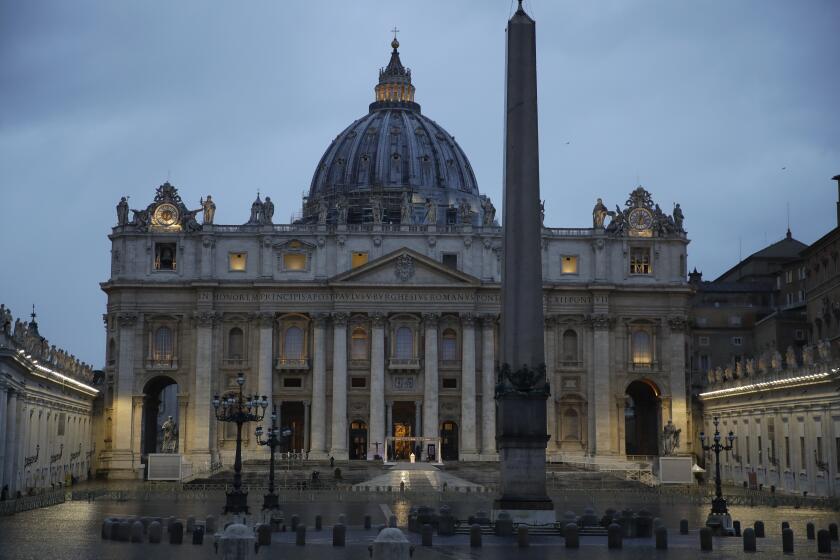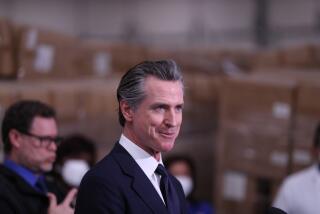Climate change is central to both Pope Francis and Newsom. But do Catholic voters care?
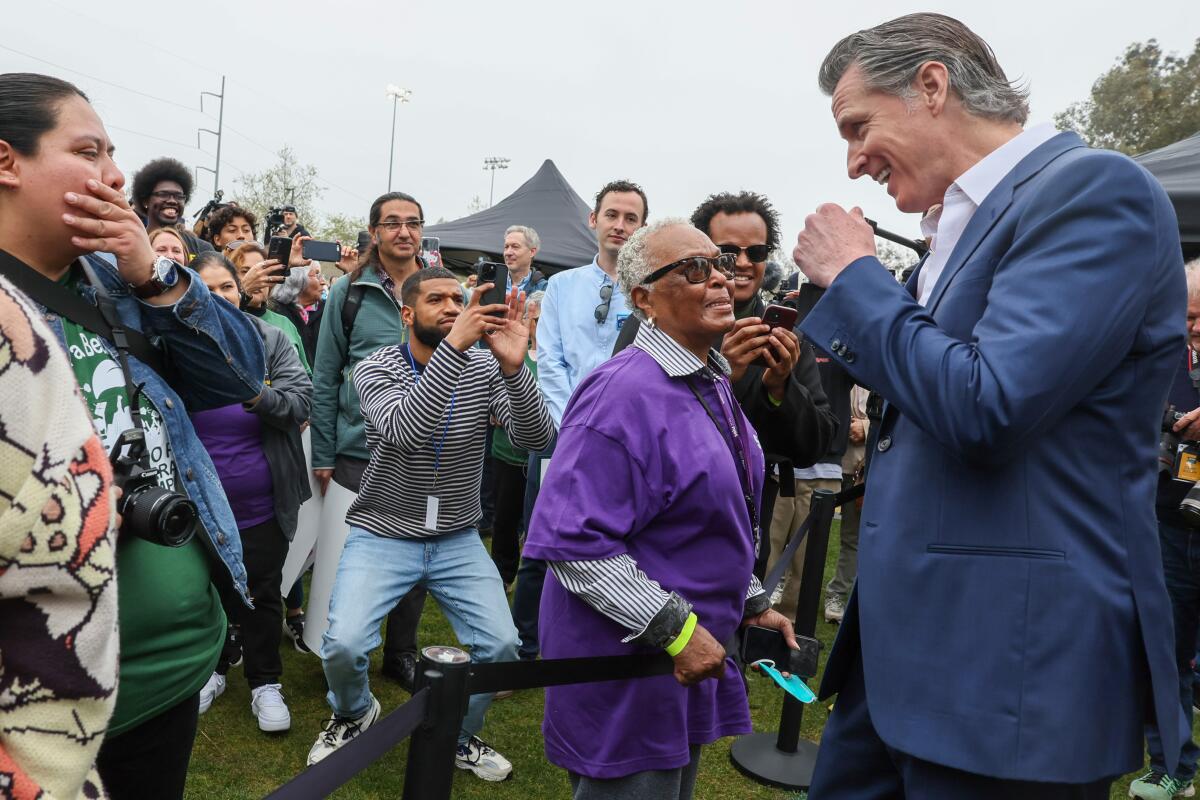
ROME — Democratic Gov. Gavin Newsom’s speech on climate change at the Vatican this week gives him an opportunity to align himself and his party with Pope Francis, an influential figure among American Catholics and a leader in the fight against global warming.
But the California governor and the pope’s messages about reducing emissions may not sway American Catholics voting in the 2024 election, especially a monumental presidential contest that could alter national and global climate policies for generations.
Despite the high importance of elections to their shared climate concerns, the issue doesn’t historically drive the pope’s Catholic flock — or typical U.S. voters — to the polls. Catholics appear poised to back Donald Trump, a president who denies global warming and has threatened to reverse environmental protections, over a climate advocate in President Biden, according to a recent Pew Research Center survey.
“It’s not really a top tier issue,” said John K. White, an emeritus professor of politics at Catholic University of America. “But sometimes you have to put what you see as the interests of the country, and in this case, the world, ahead of how you think it’s going to play politically.”
Shortly before the governor boarded a plane bound to Rome on Tuesday, Newsom told reporters he plans to discuss the “leading initiatives” California has taken to address the crisis.
“No state has more to lose, not just more to gain, in terms of addressing climate change,” Newsom said at a news conference on mental health and homelessness in San Mateo County.
Pope Francis is the first pontiff to make climate change central to his papacy, and wrote a 2015 encyclical that relied on scientific facts about global warming to deliver a moral call to preserve the planet for future generations. He offered a second, more-aggressive decree last fall with another paper, called “Laudate Deum,” or “Praise God,” that challenged countries to protect God’s creation and commit to end the use of fossil fuels before it’s too late.
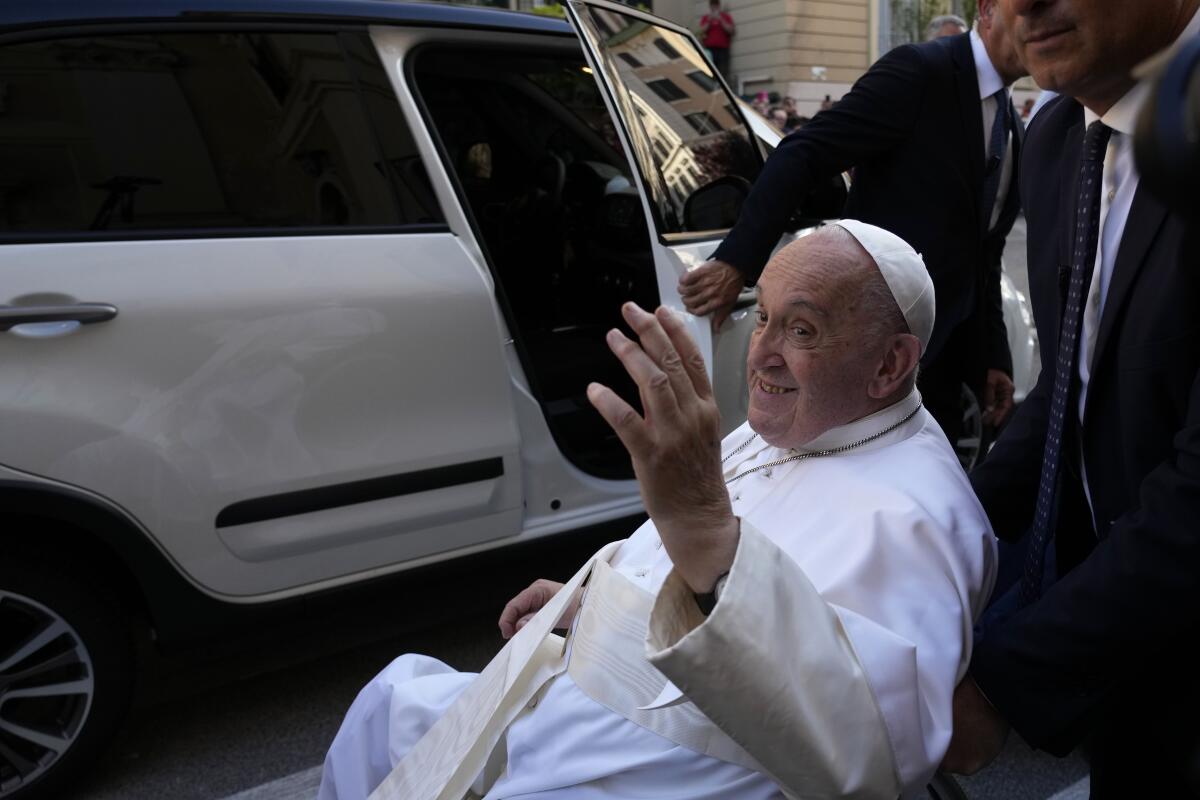
The pope’s climate advocacy, however, has not been fully embraced by deeply divided Catholic voters in the U.S., who vote more like the general electorate than strictly theological voters.
“They have concerns about climate, but that doesn’t rank nearly as high as the economy and they tend to be much more ethnic voters certainly than theological voters,” said Mike Madrid, a Republican political consultant based in California.
Though the pope has been critical of Trump’s U.S.-Mexico border policies, he does not formally endorse one presidential candidate over another and avoids directly meddling in U.S. elections. He influences policy through his own advocacy, such as gathering governors and mayors from around the globe to the climate summit at the Vatican this week to testify about how climate change has affected their own communities.
Gov. Gavin Newsom will speak at a climate summit of mayors and governors hosted by Pope Francis at the Vatican in May.
American bishops, as a group, are more conservative than the pope and have been active in elections. Bishops voted last year to make abortion the church’s political priority in the 2024 election. Some bishops have embraced Trump, who made good on a campaign promise to overturn Roe v. Wade.
The U.S. Conference of Catholic Bishops considered voting in 2021 to refuse communion to Catholic politicians who support abortion rights, including Biden. The Vatican warned the conference against doing so and the bishops ultimately stopped short of a ban.
A pro-Trump faction of white Catholics feels threatened by the growing power of more liberal Latino Catholics within the church and resists the pope’s more-progressive policies, White said. They also tend to care more about abortion rights.
Latino Catholics, who favor Biden by a slim margin, are more concerned about the environment than their white peers, though the economy and immigration typically rank higher than climate change, according to White, Madrid and Pew data.
“They care about feeding their kids more than they are worried about these larger global issues,” Madrid said.
The views of Catholic voters are similar to the overall electorate. In a New York Times Poll conducted in late April and early May, U.S. registered voters ranked the economy as the most important single issue in the 2024 election, followed by immigration and abortion.
Aides to the governor say Newsom’s trip is focused on the existential worldwide environmental threat and isn’t a political calculation.
The governor is going to the Vatican as an evangelist on climate change and to testify about California’s experience and leadership, said Sean Clegg, a senior political advisor to Newsom.
“To be seen as a leader, and California is not just a national leader, but it’s really truly a global leader, you have to stand up and tell your story,” Clegg said.
Newsom’s predecessor, Gov. Jerry Brown, blasted former President Trump’s climate policies during a speech at the Vatican in 2017 that intentionally exposed the divide between California and the White House to the world.
Newsom is expected to call out climate skeptics and oil and gas companies that profit off the burning of fossil fuels, and demand that world leaders consider the grave implications of elections in the U.S. and abroad this year. But he is not expected to mention Trump by name in his address to the pope and international leaders.
Newsom will undoubtedly hype the state’s climate policies, including efforts to meet the goal of reaching carbon neutrality by 2045 and ambitions to phase out new gas-powered vehicles, and reference his own battles with oil companies. The governor will also offer testimony about the historic wildfires that have decimated California rural towns, floods that have ravaged picturesque coastal communities and years of drought that altered the state’s farmlands.
In his revised budget proposal, Gov. Gavin Newsom lays out his plan to shrink California’s yawning deficit. Here’s what’s in it.
Outside the conference, Newsom is expected to sit down with the president of Italy and the mayor of Rome and travel to Bologna to sign a memorandum of understanding on addressing climate change. On a trip to Asia last fall, the California governor reached similar agreements with China, the provinces of Guangdong and Jiangsu, and the municipalities of Beijing and Shanghai.
For Newsom, meeting with the leader of the Catholic Church will almost assuredly enhance his national and worldwide political profile.
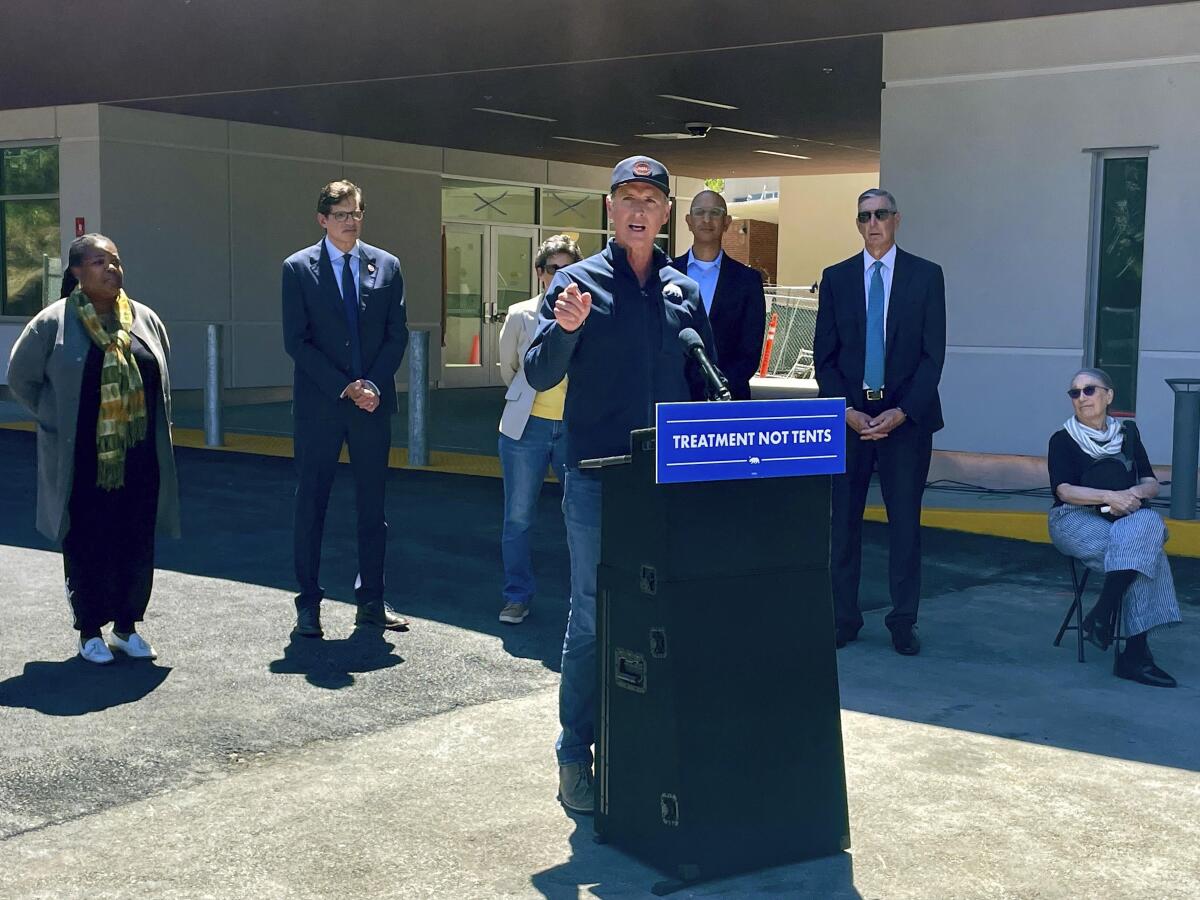
The pope enjoys a 75% approval rating among U.S. Catholics and — whether it’s discussing Gaza, Ukraine or the environment — his voice extends beyond the church.
Pope Francis called out the U.S. in his “Laudate Deum” letter last fall, pointing out that its emissions per individual are about two times greater than China‘s and about seven times greater than the average of the poorest countries in the world, said Mary Novak, executive director of the nonprofit NETWORK Lobby for Catholic Social Justice.
Newsom’s trip to the Vatican also gives him a chance to promote the state’s environmental agenda just days after he announced a proposal to reduce spending on climate change in California by $3.6 billion to close a budget deficit.
Being seen as a leader on climate in a country that the pope has criticized could benefit the governor. Massachusetts Gov. Maura Healy and Boston Mayor Michelle Wu are also attending the conference.
“These are leaders who have been fighting climate change and [for] the transition to a clean energy economy for a very long time,” Novak said.
She added that it’s smart for the Pontifical Academy of Sciences to invite leaders who can address climate change in their own states and communities to the conference, which is geared around slowing global warming and reducing emissions but also adapting to the reality of rising seas and hotter temperatures.
Newsom’s visit could deepen his standing with climate activists and young people, who care more about the environment than their parents.
“Being seen with the pope is still beneficial,” White said. “The Holy See is an important player on the world stage, not only in climate change, but also in diplomacy.”
Times Staff Writer Anabel Sosa contributed to this report.
More to Read
Sign up for Essential California
The most important California stories and recommendations in your inbox every morning.
You may occasionally receive promotional content from the Los Angeles Times.
